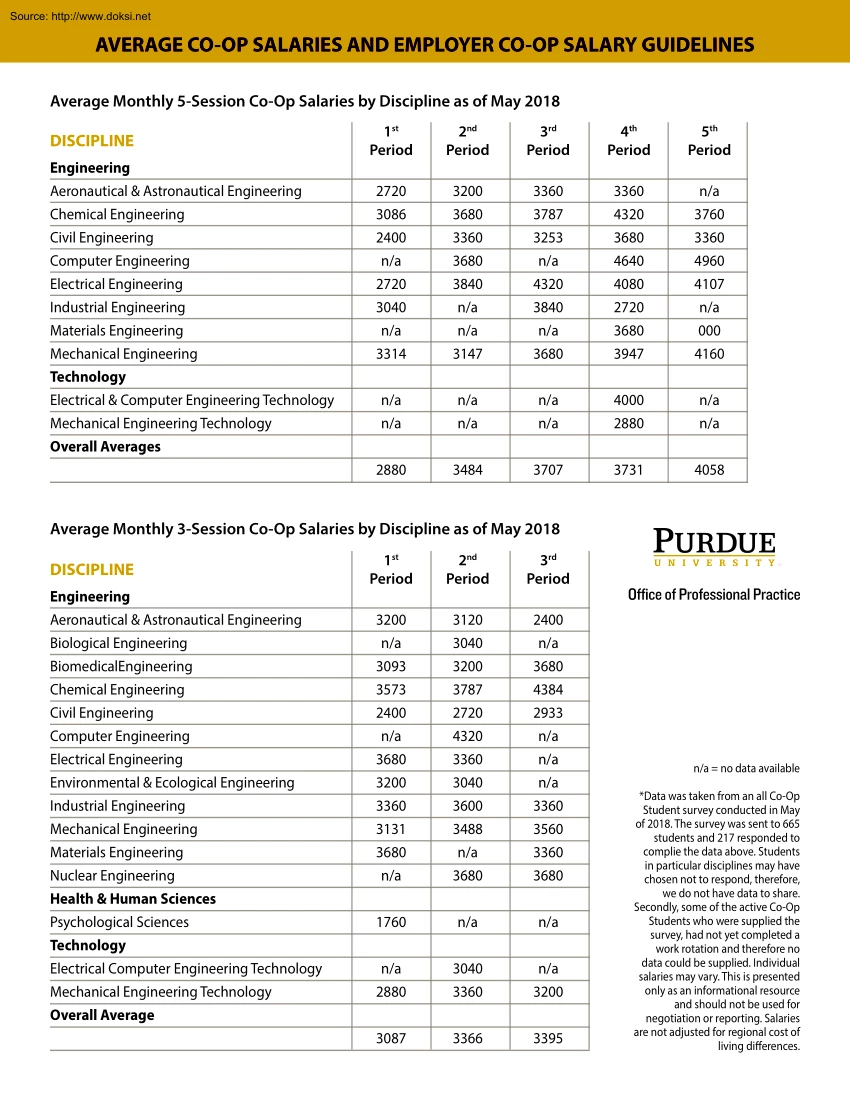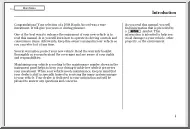A doksi online olvasásához kérlek jelentkezz be!

A doksi online olvasásához kérlek jelentkezz be!
Nincs még értékelés. Legyél Te az első!
Mit olvastak a többiek, ha ezzel végeztek?
Tartalmi kivonat
Source: http://www.doksinet AVERAGE CO-OP SALARIES AND EMPLOYER CO-OP SALARY GUIDELINES Average Monthly 5-Session Co-Op Salaries by Discipline as of May 2018 1st Period 2nd Period 3rd Period 4th Period 5th Period Aeronautical & Astronautical Engineering Chemical Engineering Civil Engineering 2720 3086 3200 3680 3360 3787 3360 4320 n/a 3760 2400 3360 3253 3680 3360 Computer Engineering Electrical Engineering Industrial Engineering n/a 2720 3680 3840 n/a 4320 4640 4080 4960 4107 3040 n/a 3840 2720 n/a Materials Engineering Mechanical Engineering n/a n/a n/a 3680 000 3314 3147 3680 3947 4160 n/a n/a n/a n/a n/a n/a 4000 2880 n/a n/a 2880 3484 3707 3731 4058 DISCIPLINE Engineering Technology Electrical & Computer Engineering Technology Mechanical Engineering Technology Overall Averages Average Monthly 3-Session Co-Op Salaries by Discipline as of May 2018 DISCIPLINE Engineering Aeronautical & Astronautical Engineering
Biological Engineering BiomedicalEngineering Chemical Engineering Civil Engineering Computer Engineering Electrical Engineering Environmental & Ecological Engineering Industrial Engineering Mechanical Engineering Materials Engineering Nuclear Engineering Health & Human Sciences Psychological Sciences Technology Electrical Computer Engineering Technology Mechanical Engineering Technology Overall Average 1st Period 2nd Period 3rd Period 3200 n/a 3120 3040 2400 n/a 3093 3573 2400 n/a 3680 3200 3360 3131 3680 n/a 3200 3787 2720 4320 3360 3040 3600 3488 n/a 3680 3680 4384 2933 n/a n/a n/a 3360 3560 3360 3680 1760 n/a n/a n/a 2880 3040 3360 n/a 3200 3087 3366 3395 n/a = no data available *Data was taken from an all Co-Op Student survey conducted in May of 2018. The survey was sent to 665 students and 217 responded to complie the data above. Students in particular disciplines may have chosen not to respond, therefore, we do not have data to share. Secondly, some of
the active Co-Op Students who were supplied the survey, had not yet completed a work rotation and therefore no data could be supplied. Individual salaries may vary. This is presented only as an informational resource and should not be used for negotiation or reporting. Salaries are not adjusted for regional cost of living differences. Source: http://www.doksinet EMPLOYER CO-OP SALARY GUIDELINES Salaries paid to co-op students are determined by employers in a number of ways. The factors most frequently used to set the salary of a particular co-op are amount of work experience and academic classification. Of these two, it is most appropriate to relate the co-op student's salary to the amount of work experience they have completed with the employer. Determining the salary from the student's academic classification in many cases results in penalties to the student, as Purdue's various Schools are not consistent in the methods they use to determine a student’s semester
classifications (1 through 8 for first-semester freshmen through last-semester seniors). In the co-op program at Purdue, we require that a co-op student maintain satisfactory progress toward their degree. Thus, the academic progress is typically related to the number of work sessions the student has completed - even though the progress does not occur in uniform steps due to the limited nature of our summer sessions. In order to overcome some of the inequities co-op students have experienced in salary administration, we recommend that the co-op salary schedule be related to the salary currently being offered to graduating seniors in the same discipline as the co-op student. Specifically, we recommend that the salary paid to a co-op student during a particular work session be some percentage of the salary the employer is offering the graduating professional. A recommended range of percentages for each work period and program type is given below: The first co-op work period is primarily
orientation and the student is less productive than during subsequent work periods. Thus, the incremental increase between periods one and two is less than between subsequent periods when the student contributes more substantially to the employer's mission. During the last one or two work periods, the student should be doing the work of a graduate professional with about one year of experience. Thus, paying them the rate of 75 to 85% of a graduate professional is a tremendous financial bargain! Where a particular student is placed within the range for a particular work period might be determined by the quality of their academic and job performance. Relating co-op salaries to the salaries offered graduating professionals has the following benefits: 1. As the scale for graduating professionals changes due to inflation, demand, etc., the coop salary is automatically adjusted. 2. The method allows co-op salaries to be influenced by local cost of living and general employer salary
practices. 3. The method eliminates the inconsistencies in relating co-op salaries to student semester classifications. 4. Co-op salaries can be adjusted slightly to recognize above-average or below-average academic or job performance. Salaries offered to prospective co-op students for the first work period should be competitive with those being tendered by other employers, as the initial salary is one of the factors prospective co-op students consider in deciding between competing offers. 5-Session 3-Session Work Period 1 2 3 4 5 Graduate Salary Offers 58-62% 62-70% 70-75% 75-80% 80-85% Work Period 1 2 3 Graduate Salary Offers 70-75% 75-80% 80-85%
Biological Engineering BiomedicalEngineering Chemical Engineering Civil Engineering Computer Engineering Electrical Engineering Environmental & Ecological Engineering Industrial Engineering Mechanical Engineering Materials Engineering Nuclear Engineering Health & Human Sciences Psychological Sciences Technology Electrical Computer Engineering Technology Mechanical Engineering Technology Overall Average 1st Period 2nd Period 3rd Period 3200 n/a 3120 3040 2400 n/a 3093 3573 2400 n/a 3680 3200 3360 3131 3680 n/a 3200 3787 2720 4320 3360 3040 3600 3488 n/a 3680 3680 4384 2933 n/a n/a n/a 3360 3560 3360 3680 1760 n/a n/a n/a 2880 3040 3360 n/a 3200 3087 3366 3395 n/a = no data available *Data was taken from an all Co-Op Student survey conducted in May of 2018. The survey was sent to 665 students and 217 responded to complie the data above. Students in particular disciplines may have chosen not to respond, therefore, we do not have data to share. Secondly, some of
the active Co-Op Students who were supplied the survey, had not yet completed a work rotation and therefore no data could be supplied. Individual salaries may vary. This is presented only as an informational resource and should not be used for negotiation or reporting. Salaries are not adjusted for regional cost of living differences. Source: http://www.doksinet EMPLOYER CO-OP SALARY GUIDELINES Salaries paid to co-op students are determined by employers in a number of ways. The factors most frequently used to set the salary of a particular co-op are amount of work experience and academic classification. Of these two, it is most appropriate to relate the co-op student's salary to the amount of work experience they have completed with the employer. Determining the salary from the student's academic classification in many cases results in penalties to the student, as Purdue's various Schools are not consistent in the methods they use to determine a student’s semester
classifications (1 through 8 for first-semester freshmen through last-semester seniors). In the co-op program at Purdue, we require that a co-op student maintain satisfactory progress toward their degree. Thus, the academic progress is typically related to the number of work sessions the student has completed - even though the progress does not occur in uniform steps due to the limited nature of our summer sessions. In order to overcome some of the inequities co-op students have experienced in salary administration, we recommend that the co-op salary schedule be related to the salary currently being offered to graduating seniors in the same discipline as the co-op student. Specifically, we recommend that the salary paid to a co-op student during a particular work session be some percentage of the salary the employer is offering the graduating professional. A recommended range of percentages for each work period and program type is given below: The first co-op work period is primarily
orientation and the student is less productive than during subsequent work periods. Thus, the incremental increase between periods one and two is less than between subsequent periods when the student contributes more substantially to the employer's mission. During the last one or two work periods, the student should be doing the work of a graduate professional with about one year of experience. Thus, paying them the rate of 75 to 85% of a graduate professional is a tremendous financial bargain! Where a particular student is placed within the range for a particular work period might be determined by the quality of their academic and job performance. Relating co-op salaries to the salaries offered graduating professionals has the following benefits: 1. As the scale for graduating professionals changes due to inflation, demand, etc., the coop salary is automatically adjusted. 2. The method allows co-op salaries to be influenced by local cost of living and general employer salary
practices. 3. The method eliminates the inconsistencies in relating co-op salaries to student semester classifications. 4. Co-op salaries can be adjusted slightly to recognize above-average or below-average academic or job performance. Salaries offered to prospective co-op students for the first work period should be competitive with those being tendered by other employers, as the initial salary is one of the factors prospective co-op students consider in deciding between competing offers. 5-Session 3-Session Work Period 1 2 3 4 5 Graduate Salary Offers 58-62% 62-70% 70-75% 75-80% 80-85% Work Period 1 2 3 Graduate Salary Offers 70-75% 75-80% 80-85%




 Ahogy közeledik a történelem érettségi, sokan döbbennek rá, hogy nem készültek fel eléggé az esszéírás feladatra. Módszertani útmutatónkban kitérünk a történet térbeli és időbeli elhelyezésére, a források elemzésére és az eseményeket alakító tényezőkre is.
Ahogy közeledik a történelem érettségi, sokan döbbennek rá, hogy nem készültek fel eléggé az esszéírás feladatra. Módszertani útmutatónkban kitérünk a történet térbeli és időbeli elhelyezésére, a források elemzésére és az eseményeket alakító tényezőkre is.